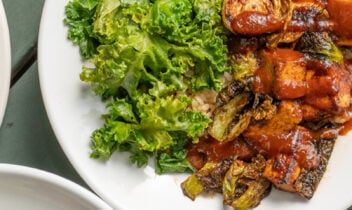TheBUZZ : Bromelain in pineapples can minimize joint pain and inflammation?
WHAT THEY’RE SAYING
Bromelain can decrease inflammation that is associated with joint pain, inflammatory bowel disease (IBD), and other inflammatory diseases.
WHAT WE KNOW
Bromelain is a mixture of protein-digesting enzymes found in pineapples. Pineapple has been used for centuries in Central and South America to treat indigestion and reduce inflammation. Bromelain, which is derived from the stem and juice of the pineapple, was first isolated from the pineapple plant in the late 1800s when it was approved to treat swelling and inflammation following surgery.
How does it decrease inflammation? Bromelain minimizes the ignition of the molecules associated with activating the inflammatory process in the body. However, the mechanisms are currently not completely understood and it’s thought to be multifaceted. Also, current studies include concentrated amounts of bromelain, either injected or taken orally.
Currently, we have not seen published studies that document specific changes in inflammation following consumption of the pineapples (versus supplementation with the purified extract).
HOW DO WE KNOW THIS?
A study published in Clinical Immunology examined biopsies of patients diagnosed with inflammatory bowel disease (Chron’s disease or ulcerative colitis) who were treated with bromelain serum. The study found that bromelain decreased activity of inflammatory mediators and could potentially provide anti-inflammatory treatment for patients suffering from IBD, however, further investigation is needed.¹
Another study published in Phytomedicine found that bromelain may be effective in alleviating the physical symptoms of mild knee pain and improving the quality of life of individuals suffering from the condition. While this study found positive associations between bromelain and the decrease in knee pain, larger randomized, controlled clinical trails are needed to justify this correlation.²
Both studies, along with other studies in the literature, expressed a need for further investigation of the anti-inflammatory effects of bromelain.
OUR ADVICE
Do not start supplementing with bromelain if you have any sort of inflammatory problem! Like any supplement, you should consult with your doctor before taking it! Currently there is no conclusive evidence linking bromelain to decreased inflammation. For now, if you’re experiencing joint pain or GI discomfort, eat a balanced diet—rich in fruits and veggies—and get regular physical activity!
If you have IBD …
- Read our article on GI discomfort.
- Get your fiber! Fiber in fruits and veggies can prevent constipation and therefore can be used as a preventative measure against flare-ups and discomfort.
If you have joint pain …
- Watch your weight. It helps to maintain a healthy weight, which takes tension off of the joints.
- Get your vitamins and minerals! Fruits and vegetables provide vitamins and minerals that are needed for proper functioning of all body organs—including bones!
Bromelain is only one of the beneficial nutrients found in pineapples, which also provide vitamin C (helps promote collagen formation and improve iron absorption, among other functions) and manganese (supports metabolism and bone density). Check out our Top 10 Ways to Enjoy Pineapples!
¹ Onken, J., P. Greer P., B. Calingaert, L. Hale. “Bromelain Treatment Decreases Secretion of Pro-Inflammatory Cytokines and Chemokines by Colon Biopsies in Vitro.” Clinical Immunology (2008): 126: 345-52.
² Walker, A., R. Bundy, S. Hicks, et al. “Bromelain Reduces Mild Acute Knee Pain and Improves Well-Being in a Dose-Dependent Fashion in an Open Study of Otherwise Healthy Adults.” Phytomedicine (2002): 9: 681-86.
|


